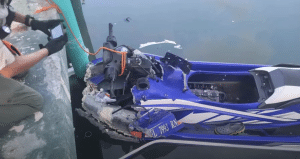Father and Son Killed in Tragic Personal Watercraft Crash in Marathon in The Florida Keys

Photo Credit: Keys Weekly
Officials reported that a fatal personal watercraft accident claimed the lives of a 47-year-old man and his 9-year-old son this week in Marathon in the Florida Keys. The crash took place at 7 p.m. on Tuesday, August 13, when the small watercraft collided with a seawall in a Boot Key Harbor canal.
Reports indicate that the watercraft was traveling at a high rate of speed when it struck the seawall. The father was ejected approximately 20 feet onto land and was pronounced dead at the scene. Bystanders rescued the son from the water, but he went into cardiac arrest during emergency transport and passed away at Mariners Hospital in Tavernier.
The circumstances surrounding who was operating the watercraft at the time of the crash remain unclear, and there are conflicting accounts regarding the speed of the vessel prior to the incident. Alcohol has been ruled out as a factor. The father and son, who were living part-time in Miami and the Florida Keys, had plans to relocate permanently. Their identities have not been publicly released.
PWCs are involved in many serious injuries
The US Coast Guard reports that personal watercraft (PWCs) are involved in 30% of boating accidents and 36% of all boating injuries. Collisions with other boats are the most common cause of injuries and deaths in such accidents. Inattention, excessive speed, and loss of control are all common contributors to these dangerous accidents. Additionally, PWC operators are more likely to die from blunt-force trauma than drowning, as riders and passengers are frequently thrown from the watercraft during collisions. Common injuries include broken limbs, teeth, and noses, sometimes from hitting the handlebars and others simply from hitting the water at high speed.
Inexperience is a major factor in PWC crashes
When it comes to PWC accidents, one of the most common causes is inexperienced riders.
“It is all about training,” said Jack Hickey, maritime and personal injury lawyer, “that is why Florida Statutes require certain training by the Jet ski rental companies.”
USCG statistics also show that inexperience is a leading cause of PWC crashes. For instance, most accidents involve operators between the ages of 11 and 20. These key findings also indicate the role of inexperience in PWC crashes:
- Just 18% of accidents involved the owner of the PWC.
- 29% of accidents involved an owner’s siblings.
- 53% of accidents involved an owner’s friends.
- 84% of PWC accidents involved operators with no boating safety education or instruction.
- 73% of operators had been riding for under an hour when their accident occurred.
- 48% of those injured had either never operated a PWC before or had only done so once.
Some PWC models include a key that limits engine power for new riders to prevent them from traveling at high speeds, which increases the risk of a crash and severe injuries.
Laws aim to limit PWC accidents
The Florida Fish and Wildlife Conservation Commission (FWC) lists regulations for different types of watercraft. Here are the rules when it comes to PWCs in Florida:
- All operators, riders, and those being towed must wear a non-inflatable, approved personal flotation device (PFD).
- The operator must attach the engine cutoff switch lanyard to their person, clothing, or PFD if the PWC is equipped with one.
- PWCs cannot operate from 30 minutes after sunset to 30 minutes before sunrise, even with navigation lights.
- Actions like weaving through congested traffic, jumping wakes too close to other vessels, or last-minute swerving to avoid collisions are considered reckless – the law classifies these behaviors as first-degree misdemeanors.
- Operators of PWC must be 14 years old, and you must be 18 years old to rent a PWC in Florida.
- Allowing someone under 14 to operate a PWC is a second-degree misdemeanor.
- Anyone born on or after January 1, 1988, must complete a NASBLA-approved boating education course or pass an equivalency exam and carry both a boating education ID card and a photo ID when operating a vessel with a motor of 10 HP or more in Florida.
It is worth noting that PWCs have engine options ranging from 120 to 180 HP, allowing them to reach speeds up to 50 or 60 miles per hour. Such capabilities highlight the importance of following the state’s regulations. Those who don’t abide by such rules can face legal consequences.
Who is at fault in a PWC crash?
Liability for PWC crashes will depend on the facts of each incident. However, there are several parties that might be at fault. Here are some individuals and companies that are potentially liable for a PWC accident:
- The operator
- Other boaters
- Swimmers and others on the water
- The manufacturer (if the device malfunctioned)
- The business that sold the PWC
- The rental company
- A mechanic who performed faulty repairs
When another party contributed to or caused a PWC crash, the injured person or people can seek compensation for their injuries. Damages may include:
- Medical expenses
- Wages lost because of injuries and lost earning potential
- Property damage
- Costs of home modifications, if made necessary by the injury
- Adaptive technology (wheelchairs, prosthetics, etc.)
- Pain, suffering, and emotional damages
- Burial and funeral expenses if the accident caused a wrongful death
The only way to know how these laws would apply in a particular case is to discuss the accident with an experienced maritime injury lawyer.
Hickey Law Firm specializes in “life changing injuries”®. Call today. Call now. 800.215.7117
John H. (Jack) Hickey has been distinguished by The Best Lawyers in America in three key areas: Admiralty and Maritime Law, Personal Injury Litigation – Plaintiffs, and Medical Malpractice – Plaintiffs. Hickey holds Board Certification in Civil Trial Law from the National Board of Trial Advocacy and is also dual Board Certified by the Florida Bar in Civil Trial and Admiralty and Maritime Law.
Contact our office by phone or fill out our contact form today to arrange a free consultation with one of our Miami injury attorneys. You pay no fees unless we secure a win for you!

Attorney John H. (Jack) Hickey and his team handle a wide range of cases, including but not limited to cruise ship accidents, admiralty and maritime accident cases, medical malpractice, wrongful death, premises liability, railroad accidents and car accidents. We represent victims from all over the nation, the world and the state of Florida.
Read more about how Jack Hickey can help you.

